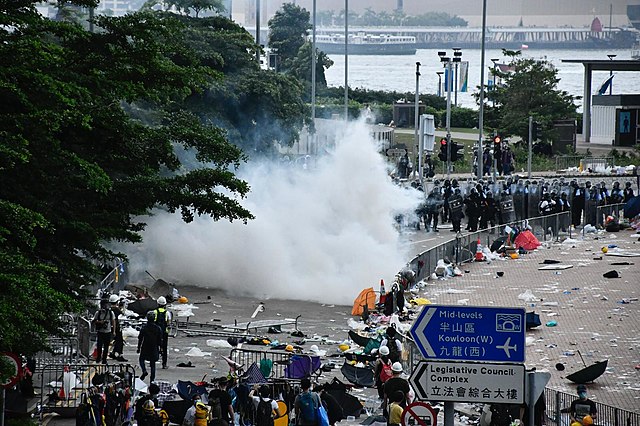
HONG KONG — Riot police fired tear gas Sunday after a large crowd of protesters at a Hong Kong shopping district ignored warnings to disperse in a second straight day of clashes, sparking fears of more violence ahead of China’s National Day.
Police cordoned off part of a street at Hong Kong’s Causeway Bay area after a large crowd started to amass for an anti-China rally. Shops were shuttered and the atmosphere was tense as protesters chanted slogans and hurled abuse at police.
The crowd swelled to more than 1,000 people, with many spilling into adjacent streets. Police issued several warnings to the crowd that they were participating in an illegal assembly. Officers later fired tear gas canisters to clear a main thoroughfare after some protesters threw bottles and other objects in their direction. Several people were detained.
Sunday’s gathering, a continuation of monthslong protests for greater democracy in the semi-autonomous Chinese territory, is part of global “anti-totalitarianism” rallies planned in over 60 cities worldwide to denounce “Chinese tyranny.”
On Saturday, police also fired tear gas and water cannons after protesters threw bricks and firebombs at government buildings following a massive rally in downtown Hong Kong. The clashes were part of a familiar cycle since protests began in June over a now-shelved extradition bill and have since snowballed into an anti-China movement.
Protesters are also planning to march on Tuesday despite a police ban, sparking fears of more ugly scenes that could embarrass Chinese President Xi Jinping as his ruling Communist Party marks its 70th year in power.
Many said they will wear mourning black in a direct challenge to the authority of the Communist Party, with posters calling for Oct. 1 to be marked as “A Day of Grief.”
Hong Kong’s government has already scaled down National Day celebrations in the city, cancelling an annual firework display and moving a reception indoor.
Despite security concerns, the government said Sunday that Chief Executive Carrie Lam will lead a delegation of over 240 people to Beijing on Monday to participate in the festivities. She will be represented by Chief Secretary Matthew Cheung in her absence and return to the city on Tuesday evening.
Lam held her first community dialogue with the public on Thursday in a bid to diffuse tensions but failed to persuade protesters, who vowed to press on until their demands including direct elections for the city’s leader and police accountability are met.
Earlier Sunday, hundreds of pro-Beijing supporters gathered at a waterfront cultural centre in a counter show of solidarity for Chinese rule. Wearing red and carrying Chinese flags and posters, they chanted “I am a citizen of China” and sang the national anthem and happy birthday to China. They were later bused to the Victoria Peak hilltop for the same repertoire.
Organizer Innes Tang saidthe crowd, all Hong Kong citizens, responded to his invitation on social media to “promote positivityand patriotism” and urged protesters to replace violence with dialogue.
“We want to take this time for the people to express our love for our country China. We want to show the international community that there is another voice to Hong Kong” apart from the protests, he said.
Mobs of pro-Beijing supporters have appeared in malls and on the streets in recent weeks to counter pro-democracy protesters, leading to brawls between the rival camps.
Many people view the extradition bill, that would have sent criminal suspects to mainland China for trial, as a glaring example of the erosion of Hong Kong’s autonomy under the “one country, two systems” policy when the former British colony returned to Chinese rule in 1997.
China has denied chipping away at Hong Kong’s freedom and accused the U.S. and other foreign powers of fomenting the unrest to weaken its dominance.
In Beijing on Sunday, former Hong Kong leader Tung Chee-hwa was recognized for devoting himself to the implementation of the “one country, two systems” policy. Tung, the first leader after Hong Kong’s return to China, was among 42 people who received national medals and honours from Xi for their contributions to the country.